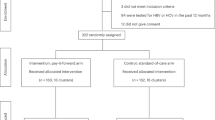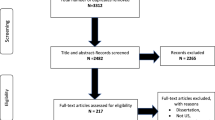Abstract
Several HIV testing models have been implemented in sub-Saharan Africa (SSA) to improve access to HIV testing, but uptake remains poor. HIV Self-Testing (HIVST) is now available, and may serve to overcome barriers of current testing models which include stigma, discrimination and non-confidential testing environments. A scoping study was conducted to provide an overview of the current literature in SSA, as well as identify future research needs to scale-up HIVST and increase HIV testing uptake. The outcome of the review indicated only 11 reported studies to date, showing variable acceptability (22.3–94%) of HIVST, with acceptability of HIVST higher among men than women in SSA. We conclude that research around HIVST in SSA is still in its infancy, and further implementation research and interventions are required to improve acceptability of HIVST among diverse study populations, failing which policy adoption and scale-up may be hindered.

Similar content being viewed by others
References
Asante AD. Scaling up HIV prevention: why routine or mandatory testing is not feasible for sub-Saharan Africa. Bull World Health Organ. 2007;85(8):644–6.
UNAIDS. 90-90-90 An ambitious treatment target to help end the AIDS epidemic. Geneva: United Nations; 2014.
Johnson C, Baggaley R, Forsythe S, van Rooyen H, Ford N, Napierala Mavedzenge S, et al. Realizing the potential for HIV self-testing. AIDS Behav. 2014;18(Suppl 4):S391–5.
Cambiano V, Mavedzenge SN, Phillips A. Modelling the potential population impact and cost-effectiveness of self-testing for HIV: evaluation of data requirements. AIDS Behav. 2014;18(Suppl 4):S450–8.
Daniel OE. Acceptability and barriers to uptake of HIV testing and counselling among students of teriaty institutions in Owo Ondo state Nigeria. South American Journal of Public Health. 2014;2(1), ISSN: 2309-6470.
Kalibala S, Tun W, Cherutich P, Nganga A, Oweya E, Oluoch P. Factors associated with acceptability of HIV self-testing among health care workers in Kenya. AIDS Behav. 2014;18(Suppl 4):S405–14.
Musheke M, Ntalasha H, Gari S, Mckenzie O, Bond V, Martin-Hilber A, et al. A systematic review of qualitative findings on factors enabling and deterring uptake of HIV testing in Sub-Saharan Africa. BioMed Cent Public Health. 2013;13(220):1–16.
Nyblade L, Stangl A, Weiss E, Ashburn K. Combating HIV stigma in health care settings: what works. J Int AIDS Soc. 2009;12(1):15.
Krause J, Subklew-Sehume F, Kenyon C, Colebunders R. Acceptability of HIV self-testing: a systematic literature review. BMC Public Health. 2013;13(735):735.
Volk JE, Lippman SA, Grinsztejn B, Lama JR, Fernandes NM, Gonzales P, et al. Acceptability and feasibility of HIV self-testing among men who have sex with men in Peru and Brazil. Int J STD AIDS. 2016;27(7):531–6.
Ng OT, Chow AL, Lee VJ, Chen MI, Win MK, Tan HH, et al. Accuracy and user-acceptability of HIV self-testing using an oral fluid-based HIV rapid test. PLoS ONE. 2012;7(9):e45168.
Kurth AE, Cleland CM, Chhun N, Sidle JE, Were E, Naanyu V, et al. Accuracy and acceptability of oral fluid HIV self-testing in a general adult population in Kenya. AIDS Behav. 2015;20:870.
Wong HT, Tam HY, Chan DP, Lee SS. Usage and acceptability of HIV self-testing in men who have sex with men in Hong Kong. AIDS Behav. 2015;19(3):505–15.
Yan H, Yang H, Raymond HF, Li J, Shi LE, Huan X, et al. Experiences and correlates of HIV self-testing among men who have sex with men in Jiangsu province, China. AIDS Behav. 2015;19(3):485–91.
Lippman SA, Perisse ARS, Veloso VG, Sullivan PS, Buchbinder S, Sineath RC, et al. Acceptability of self-conducted home-based HIV testing among men who have sex with men in Brazil: data from an on-line survey. Cad Saude Publica. 2014;30(4):724–34.
Marley G, Kang D, Wilson EC, Huang T, Qian Y, Li X, et al. Introducing rapid oral-fluid HIV testing among high risk populations in Shandong, China: feasibility and challenges. BMC Public Health. 2014;14:422.
Chiu CJ, Young SD. Correlates of requesting home HIV self-testing kits on online social networks among African-American and Latino men who have sex with men. AIDS Care. 2016;28(3):289–93.
Woods WJ, Lippman SA, Agnew E, Carroll S, Binson D. Bathhouse distribution of HIV self-testing kits reaches diverse, high-risk population. AIDS Care. 2016;28(Sup1):111–3.
Bustamante MJ, Konda KA, Joseph Davey D, Leon SR, Calvo GM, Salvatierra J, et al. HIV self-testing in Peru: questionable availability, high acceptability but potential low linkage to care among men who have sex with men and transgender women. Int J STD AIDS. 2017;28(2):133–7.
Gaydos CA, Hsieh YH, Harvey L, Burah A, Won H, Jett-Goheen M, et al. Will patients “opt in” to perform their own rapid HIV test in the emergency department? Ann Emerg Med. 2011;58(1 Suppl 1):S74–8.
Gaydos CA, Solis M, Hsieh YH, Jett-Goheen M, Nour S, Rothman RE. Use of tablet-based kiosks in the emergency department to guide patient HIV self-testing with a point-of-care oral fluid test. Int J STD AIDS. 2013;24(9):716–21.
Ibitoye M, Frasca T, Giguere R, Carballo-Dieguez A. Home testing past, present and future: lessons learned and implications for HIV home tests. AIDS Behav. 2014;18(5):933–49.
Wong V, Johnson C, Cowan E, Rosenthal M, Peeling R, Miralles M, et al. HIV self-testing in resource-limited settings: regulatory and policy considerations. AIDS Behav. 2014;18(Suppl 4):S415–21.
Wood BR, Ballenger C, Stekler JD. Arguements for and against HIV self-testing. HIV/AIDS. 2014;6:117–26.
Pant Pai N, Klein MB. Are we ready for home-based, self-testing for HIV? Future HIV Ther. 2008;2(6):515–20.
Lee VJ, Tan SC, Earnest A, Seong PS, Tan HH, Leo YS. User acceptability and feasibility of self-testing with HIV rapid tests. J Acquir Immune Defic Syndr. 2007;45(4):449–53.
WHO, UNAIDS. A short technical update on self-testing for HIV. Geneva: World Health Organisation; 2014. http://www.unaids.org/sites/default/files/media_asset/JC2603_self-testing_en/. Accessed 01 March 2016.
Bateganya M, Abdulwadud OA, Kiene SM. Home-based HIV voluntary counselling and testing (VCT) for improving uptake of HIV testing. Cochrane Database Syst Rev. 2010;. doi:10.1002/14651858.CD006493.pub4 (Review).
Ramfolo M, Chidarikire T, Farirai T, Matji R. Provider-initiated counselling and testing (PICT): an overview. S Afr J HIV Med. 2011;12(2):6–11.
Mabuto T, Latka MH, Kuwane B, Churchyard GJ, Charalambous S, Hoffmann CJ. Four models of HIV counseling and testing: utilization and test results in South Africa. PLoS ONE. 2014;9(7):e102267.
Kalichman SC. HIV testing attitudes, AIDS stigma, and voluntary HIV counselling and testing in a black township in Cape Town, South Africa. Sex Transm Infect. 2003;79(6):442–7.
Arksey H, O’Malley L. Scoping studies:towards a methodological framework. Int J Soc Res Methodol. 2005;8(1):19–32.
Webster F, Krueger P, Macdonald H, Archibald D, Telner D, Bytautas J, et al. A scoping review of medical education research in family medicine. BioMed Cent Med Educ. 2015;15(1):79.
Weeks LC, Strudsholm T. A scoping review of research on complimentary and alternative medicine (CAM) and the mass media: looking back, moving forward. BioMed Cent Complement Altern Med. 2008;8(1):43.
Brien SE, Lorenzetti DL, Lewis S, Kennedy J, Ghali WA. Overview of a formal scoping review on health system report cards. Implement Sci. 2010;5(1):2.
Levac D, Colquhoun H, O’Brien KK. Scoping studies: advancing the methodology. Implement Sci. 2010;. doi:10.1186/1748-5908-5-69.
van Dyk AC. Client-initiated, provider-initiated, or self-testing for HIV: what do South Africans prefer? J Assoc Nurses AIDS Care. 2013;24(6):e45–56.
Makusha T, Knight L, Taegtmeyer M, Tulloch O, Davids A, Lim J, et al. HIV self-testing could “revolutionize testing in South Africa, but it has got to be done properly”: perceptions of key stakeholders. PLoS ONE. 2015;10(3):e0122783.
Maheswaran H, Petrou S, MacPherson P, Choko AT, Kumwenda F, Lalloo DG, et al. Cost and quality of life analysis of HIV self-testing and facility-based HIV testing and counselling in Blantyre, Malawi. BMC Med. 2016;14(1):34.
Brown B, Folayan MO, Imosili A, Durueke F, Amuamuziam A. HIV self-testing in Nigeria: public opinions and perspectives. Glob Public Health. 2015;10(3):354–65.
van Dyk AC. Self-testing as strategy to increase the uptake of HIV testing in South Africa. Afr J AIDS Res. 2013;12(1):41–8.
Maheswaran H, Petrou S, MacPherson P, Choko AT, Kumwenda F, Lalloo DG, et al. Cost and quality of life analysis of HIV self-testing and facility-based HIV testing and counselling in Blantyre, Malawi. BMC Med. 2016;14:34.
Zerbe AV, DiCarlo AL, Mantell JE, Remien RH, Morris DD, Frederix K, et al. Acceptability and uptake of home-based HIV self-testing in Lesotho. CROI Conference; 2016.
Bwambale FM, Ssali SN, Byaruhanga S, Kalyango JN, Karamagi CA. Voluntary HIV counselling and testing among men in rural western Uganda: implications for HIV prevention. BMC Public Health. 2008;8:263.
Kebede B, Abate T, Mekonnen D. HIV self-testing practices among health care workers: feasibility and options for accelerating HIV testing services in Ethiopia. Pan Afr Med J. 2013;15:50.
MacPherson P, Lalloo DG, Webb EL, Maheswaran H, Choko AT, Makombe SD, et al. Effect of optional home initiation of HIV care following HIV self-testing on antiretroviral therapy initiation among adults in Malawi: a randomized clinical trial. JAMA. 2014;312(4):372–9.
Choko AT, Desmond N, Webb EL, Chavula K, Napierala-Mavedzenge S, Gaydos CA, et al. The uptake and accuracy of oral kits for HIV self-testing in high HIV prevalence setting: a cross-sectional feasibility study in Blantyre, Malawi. PLoS Med. 2011;8(10):e1001102.
van Rooyen H, Tulloch O, Mukoma W, Makusha T, Chepuka L, Knight LC, et al. What are the constraints and opportunities for HIVST scale-up in Africa? Evidence from Kenya, Malawi and South Africa. J Int AIDS Soc. 2015;18(1):19445.
Choko AT, MacPherson P, Webb EL, Willey BA, Feasy H, Sambakunsi R, et al. Uptake, accuracy, safety, and linkage into care over two years of promoting annual self-testing for HIV in Blantyre, Malawi: a community-based prospective study. PLoS Med. 2015;12(9):e1001873.
Peck RB, Lim JM, van Rooyen H, Mukoma W, Chepuka L, Bansil P, et al. What should the ideal HIV self-test look like? A usability study of test prototypes in unsupervised HIV self-testing in Kenya, Malawi, and South Africa. AIDS Behav. 2014;18(Suppl 4):S422–32.
Brown AN, Djimeu EW, Cameron DB. A review of the evidence of harm from self-tests. AIDS Behav. 2014;18(Suppl 4):S445–9.
Martinez O, Carballo-Dieguez A, Ibitoye M, Frasca T, Brown W, Balan I. Anticipated and actual reactions to receiving HIV positive results through self-testing among gay and bisexual men. AIDS Behav. 2014;18(12):2485–95.
Figueroa C, Johnson C, Verster A, Baggaley R. Attitudes and acceptability on HIV self-testing among key populations: a literature review. AIDS Behav. 2015;19(11):1949–65.
Estem KS, Catania J, Klausner JD. HIV self-testing: a review of current implementation and fidelity. Curr HIV/AIDS Rep. 2016;13(2):107–15.
Acknowledgements
The authors thank the Centre for the AIDS Programme of Research in South Africa for their support.
Author information
Authors and Affiliations
Corresponding author
Ethics declarations
Disclosure of Potential Conflicts of interest
Charlene Harichund declares that she has no conflict of interest. M. Moshabela declares that he has no conflict of interest.
Research Involving Human Participants and/or Animals
This article does not contain any studies with human participants or animals performed by any of the authors.
Rights and permissions
About this article
Cite this article
Harichund, C., Moshabela, M. Acceptability of HIV Self-Testing in Sub-Saharan Africa: Scoping Study. AIDS Behav 22, 560–568 (2018). https://doi.org/10.1007/s10461-017-1848-9
Published:
Issue Date:
DOI: https://doi.org/10.1007/s10461-017-1848-9




